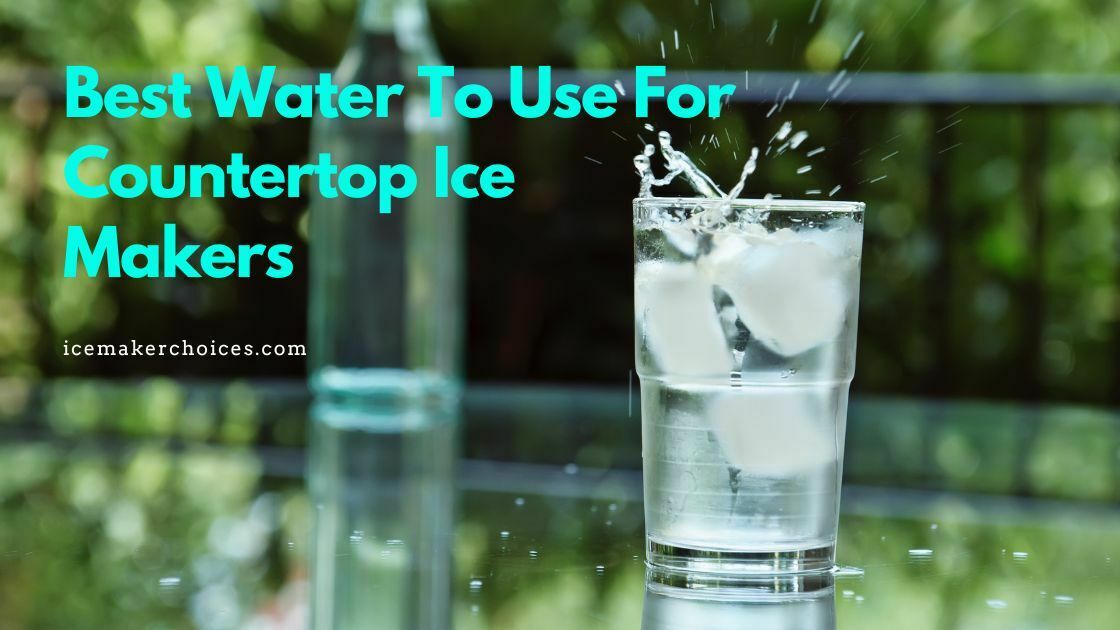Wondering about what’s the best water to use for countertop ice makers? We’ve got you covered! Having an ice maker in your home can be a great convenience, especially during the hot summer months. But if you want to make sure that your ice maker is producing clean and safe ice cubes, it’s important to use the right kind of water.
If you are reading this, it’s clear that your top priority is to produce the highest quality ice and protect your portable ice maker. Fortunately, you have come to the right place to learn about the best water to use for ice makers.
Wanting your own ice maker makes all the sense in the world, after all, countertop ice makers are the best source of clean and healthy ice to put in juices and drinks. Now you can forget about bagged store-bought cubes that are often made with questionable water quality.
With your own ice-making machine you can rest easy knowing your own homemade cubes are top-notch because nothing beats the crisp, cool taste of homemade ice produced by a portable ice maker! This takes us to our present question; in this guide, we’ll explain why it’s relevant to know about the best water to use for countertop ice makers.
Best Water To Use For Countertop Ice Makers Explained
The best water to use for countertop ice makers is filtered or distilled water since it has been purified from any impurities or contaminants.
This will ensure that the quality of your ice cubes won’t be compromised by anything lurking in your tap water. Additionally, using filtered or distilled water can also help extend the life of your countertop ice maker since it doesn’t contain minerals that could clog up the machine over time.
Filtered water has been purified through a process of passing it through a filter. This removes any impurities such as dirt, sediment, and other contaminants that may be present in the water.
Distilled water is also a great option as it has been boiled and condensed back into a liquid form. As a result, any impurities that were present in the water will be left behind during the boiling process.
Using filtered or distilled water for your countertop ice maker is not only healthier for you and your family but can also help extend its life. Minerals such as calcium and magnesium found in tap water can cause buildup within the machine over time, leading to clogging and expensive repair costs.
What Is Water That Is Safe To Drink?
Keep in mind it is essential to ensure that the water you pour into your portable ice maker is safe for human consumption, as it will be converted into the cubes of ice used for cooling drinks.
Consequently, only use clean and potable water in this device to guarantee a healthy outcome when enjoying your favorite beverage chilled with optimal-quality ice.
When it comes to the ideal water for your portable ice maker, make sure that you only use drinking-quality water. If the tap, fridge, or cooler in your home is okay for consumption – then it’ll do just fine! It’s as simple as that.
Can You Use Hard Water for a Countertop Ice Maker?
Hard water can be disastrous for your portable ice maker, as it leaves behind damaging deposits like calcium and magnesium within its unit.
In areas with extremely hard water, the freezing process is more difficult which leads to poorer performance and an increased workload for your ice maker. All of these elements essentially act against it, hindering its ability to function optimally.
Not only will this reduce the production of the appliance over time but these minerals also have a tendency to cling onto the walls, cover sensors, and corrode hinges and gears – ultimately leading to the destruction of the machine and therefore your investment.
- Will a water softener work? Water softeners may ease some of the minerals in your water, yet they also replace them with other components that can heavily affect its taste. As a result, it is unlikely to produce optimal results when making ice cubes.
- What can you do if you only have access to hard water? Installing a water filter not only safeguards your ice maker from calcium and magnesium buildup, but it will also gives you crisper-tasting cubes. By using a water filter, you’ll be extending the longevity of your ice maker while enjoying refreshingly chilled drinks.
Is distilled or fresh water, the best water to use for countertop ice makers?
Distilled Water
If you want to enjoy the clearest ice cubes possible from your portable ice maker, then go for distilled water. It’s not usually available everywhere but it is totally worth it. You will easily be able to tell the difference compared with regular tap water.
Although distilled water can be beneficial, one possible downside is that its lack of minerals may cause water sensors to fail.
To detect water levels in the reservoir, a current is sent traveling through it. Unfortunately, this method can be tricked if filtered or distilled water is used; it will falsely indicate that there’s no liquid present for ice making.
If you encounter this issue, a possible solution is utilizing half tap water and half distilled water.
If your portable ice maker signals that it is in need of water, then consider topping off its internal reservoir with distilled water. By doing this, you will benefit from the mineral-enriched water while also allowing your sensor to operate correctly.
Fresh Water
Remember the goal is to get ice that doesn’t have any flavor and that can only be achieved with the best water to use for countertop ice makers available to you; in this sense, you should only use fresh water, fresh water that doesn’t last more than 24 hours on your machine.
With portable or countertop ice makers, unlike commercial or under-counter machines, there is no fresh water intake. This means that the same water circulates within your device every rotation – which can quickly become stale and murky.
The solution? Change it daily! Swap out old contaminated H2O for the new pristine liquid to ensure a clear batch of freshly frozen cubes each time!
What features should the best water to use for countertop ice makers have?
The best water to use for ice maker or to be added to your machine should have the following characteristics:
1. Free from harmful minerals like calcium and magnesium
When it comes to the best water to use for countertop ice makers, one of the most important qualities is that it should be free from harmful minerals like calcium and magnesium.
These minerals can cause serious damage to your machine by clogging up filters and pipes, corroding internal components, and forming damaging deposits.
2. Softened to reduce mineral content if necessary
Softening water is a process that removes hard minerals from the water, such as calcium and magnesium, which can slow down or even break an ice maker.
This process is necessary for countertop ice makers that are exposed to hard water, as it will help them function better and last longer. Though it may not be the better choice for obtaining the best ice taste.
The softening process works by passing the water through a tank filled with plastic beads that act as filters. These beads are charged with salt ions, which attract and hold onto the hard minerals in the water.
The softened water then flows to other parts of your home where it can be used for various applications.
3. Free from any type of contamination
Water contamination can be a serious issue if not addressed properly. Contamination of water can lead to a variety of health issues and can even affect the taste and quality of your ice cubes. To ensure that your ice is free from any type of contamination, you should always use fresh and clean water when making ice in your countertop ice maker.
4. Filter-treated for a crisp taste
Filtering water is a process that removes impurities and contaminants from the water so that it tastes crisp and clean. It also helps to improve the texture and flavor of ice cubes. There are several methods for filtering water, but the most common is reverse osmosis.
Reverse osmosis is a method where water is forced through a semipermeable membrane that filters out particles, leaving the water clean and pure.
By using fresh, filtered, and softened water for your countertop ice maker, you can be assured of clean and delicious ice cubes each time. If any of these qualities are lacking in the water you use for your machine, it is best to replace it with a better-suited type of water.
5. Distilled or fresh water
Distilled or fresh water is the best type of water to use for countertop ice makers. Distilled water is free from any harmful minerals, such as calcium and magnesium, so it won’t damage your machine’s internal components or form damaging deposits. It also has no contaminants that could affect the taste and quality of your ice cubes.
Fresh water is also ideal for making ice because it’s free from any chemical additives or toxins that could affect the taste of your ice. If you don’t have access to distilled water, then fresh tap water is a great alternative as long as it’s filtered and softened if necessary.
If you already have a good source of the best water to use for countertop ice makers and are interested in adding your own water line to your ice-making machine, the youtube video below will show you in detail how to do so.
6. Changed daily to avoid contamination
Changing your water for the countertop ice maker daily is an important step to avoiding contamination. Although filtered and softened water may reduce the risk of contaminants, it still cannot guarantee a perfectly clean product, which is why changing the water every day should be a priority.
7. Check the water temperature
For optimal performance, ensure that the water you provide for your ice maker has a temperature range between 51F and 90F. This temperature range ensures that the ice cubes form properly.
By following these guidelines, you can be sure that your countertop ice maker is always producing pure and delicious ice cubes.
Final Thought About the Best Water To Use For Countertop Ice Makers
With the best water to use for countertop ice makers, you can rest assured that you are providing clean, great-tasting, and safe ice for yourself and your family.
In conclusion, the best water to use for countertop ice makers is distilled or fresh filtered water. Make sure it is free from any contaminants. Additionally, always change out the water daily to ensure that no contaminants build up in the tank.
With the right kind of water, you can be sure that your ice maker is providing consistently clean and delicious ice cubes for all your needs.



